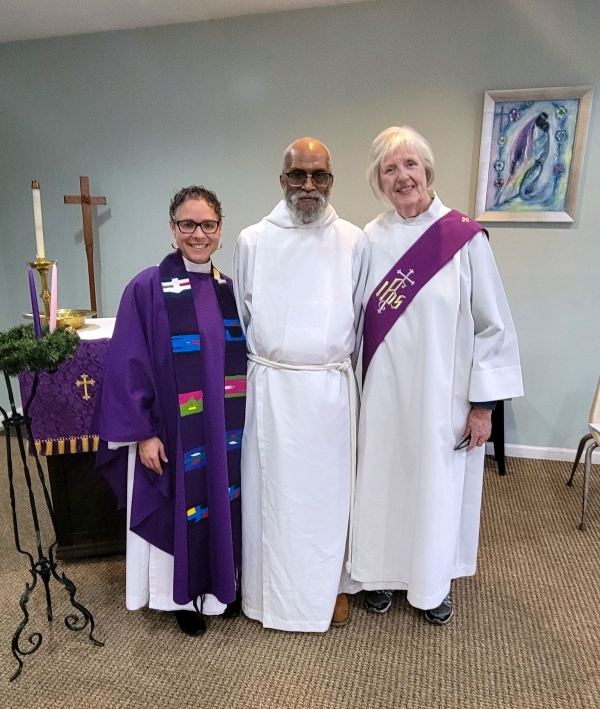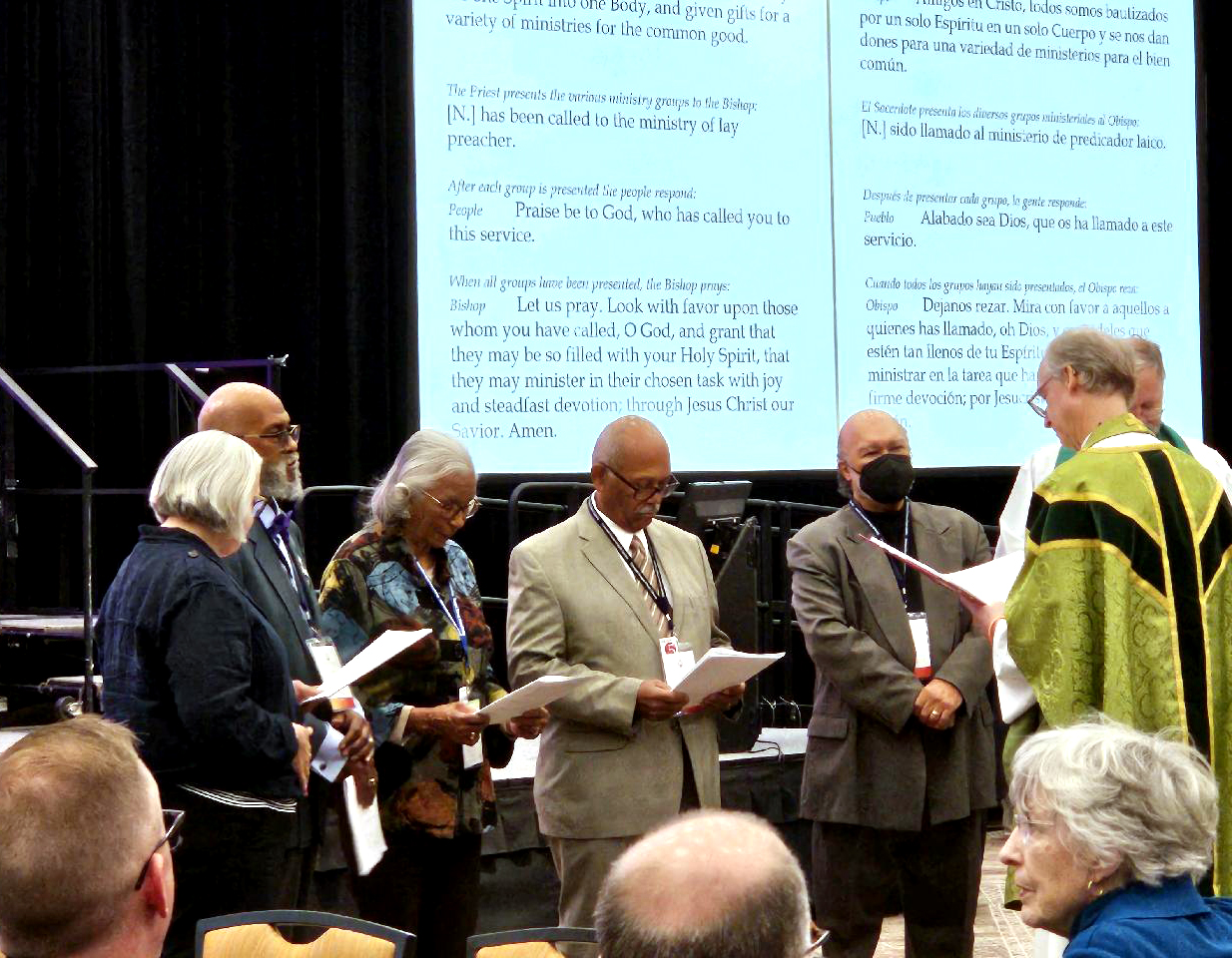
The Lay Preacher Training Initiative begins its second cohort
By Jenny Beaumont
The ministry of lay people is vital as people respond to their baptismal vows and God’s call in their lives.
The Book of Common Prayer says that ministers of the church are “to represent Christ and his Church; to bear witness to him wherever they may be; and, according to the gifts given them, to carry on Christ’s work of reconciliation in the world; and to take their place in the life, worship, and governance of the Church” (page 855). In the Diocese of North Carolina, we, too, respond to God’s call to lift up the diverse gifts in the laity. The diocesan mission priorities ensure that we will engage and support lay ministry across the diocese through discernment, training and empowerment. One way we are equipping that call is through the
Lay Preacher Training Initiative (LPTI).
“I have always believed in the very valuable ministry of the laity, and I’ve never doubted that it was my calling to serve that way,” Anne Stokes, recent graduate of the LPTI program, said. “I have always known that my relationship with scripture was strong, and I’ve always wanted to share my insights.”
[Image: Cecil Haynes with the Rev. Audra Abt and the Rev. Maureen Flak on a Sunday during which he preached at Holy Spirit, Greensboro. Photo courtesy of Jenny Beaumont]
The Diocese of North Carolina was one of six dioceses chosen to pilot the Lay Preacher Training Initiative of the Episcopal Preaching Foundation. The two-year training program, funded by a three-year, $400,000 grant from Trinity Church Wall Street, New York, culminated in a graduation ceremony at the National Cathedral in November 2023. Bishop Sam Rodman enthusiastically commissioned Jason Franklin, Robin Williams, Tony Hawkins, Cecil Haynes, Anne Stokes and Connie Sessoms for ministry within the diocese during the 208th Annual Convention later that month.
By training and supporting lay preachers in The Episcopal Church, the LPTI equips lay preaching and lay leadership alongside the ordained orders of bishops, priests and deacons. The lay voice brings the perspective of parishioners who carry their faith and the good news into their vocations outside the church back into the sanctuary. The preachers offer the voice of hope, grace and healing to their communities through preaching the Good News in their lives and in the pulpit. Their stories of faith resonate with others who spend much of their time outside the walls of the church.
“Lay preaching adds a much-needed layer of sermon development that has been underutilized for a long time,” Sessoms explained. “I, as a lay preacher, can talk to the person in the pew and relate to them on their level. I have been on their same journey, and I talk their same language. I am excited to tell God’s people about Jesus and his love and what that means for our salvation.”
The graduates of the first cohort were led through a program focused on creativity in scripture exegesis, discernment, spiritual practice, call and location, and preaching in context. The extensive bibliography included teachers ranging from Walter Brueggemann to Barbara Brown Taylor. Each participant learned from a feedback team, entered Bible study together before sermon preparation and received feedback after preaching.
“I always appreciate hearing repeated to me what I said in a sermon from a third party so that I can know if I was able to reach the listeners in the pews,” Sessoms said. “I say third party intentionally because the first party to participate with me in the sermon development was the Word of God through the Bible.”
At the end of their training, the new lay preachers expressed gratitude for the depth of the training, the care and support they felt from the cohort and the diocese, the challenge to live into this new call, and the impact of their spiritual practices and life of prayer. As they practiced their prayer lives, they gained a deepening of their faith and connection with each other.
Now the members of LPTI’s first cohort are busy practicing their ministries. Williams has preached at Chapel of the Good Shepherd, Ridgeway, and continues her work with community-based ecumenical groups to provide various opportunities for service, fellowship and worship. Hawkins serves as a member of the Bishop’s Affordable Housing Committee and serves her neighbors through sermons of action. Haynes has preached at Holy Spirit, Greensboro, and continues to assist the congregation after the vicar’s recent departure. Stokes, whose home church of Nativity, Raleigh, is in the midst of a clergy transition, also is helping to navigate the change by preaching regularly. Franklin regularly preaches at St. Paul’s, Winston-Salem, and is using his LPTI training to lead the church’s new LGBTQ+ group. Sessoms preaches at St. Michael & All Angels, Charlotte, on the second and fourth Sundays of every month. (He also has the key to the church’s temporary worship space and opens and closes the building each Sunday.)

[Bishop Sam Rodman commissions the first cohort of the Lay Preacher Training Initiative during the 208th Annual Convention. Photo by Summerlee Walter]
A SECOND COHORT BEGINS
The second group of lay preachers began their work in January. The Episcopal Preaching Foundation revised the program after the initial pilot to a one-year course that maintains the essence and the essentials of the pilot training. The second cohort will meet twice monthly—once on Zoom for 90 minutes and again at a central location. The new cohort of seven lay preachers in training began their program in January with leaders Julia Lloyd, the Rev. Darby Everhard and the Rev. Erika Takacs. The 2024 cohort includes James Moore (Church of the Saviour, Jackson), Jennifer Loher (St. Alban’s, Davidson), Robert Rubin (Trinity, Fuquay-Varina), Kimberly Yerino (St. Anne’s, Winston-Salem), Allison Kratt (St. Alban’s, Davidson) and Jerry Landry (St. Alban’s, Davidson).
Their hopes for the training include gaining “the skills I will need to be a lay preacher and give hope to those who feel lost and not worthy of God’s love,” eagerness “to go deeper into my study and understanding of the scriptures,” a desire to “better learn how to translate my own literary and spiritual understanding of the Bible into meaningful good news for others,” “developing a language that speaks authentically to the faith that I feel in my heart to share the Good News of Christ’s love with others,” and finding an “invitation to deeper growth and interpretation of God’s presence in my life, and, maybe, this can be meaningful or helpful to those listening.”
As the presence of lay preachers across the diocese grows, so does the breadth of perspectives and experiences forming what we hear from the pulpit each Sunday morning.
“The lay preacher ministry, in our ‘newness,’ provides a fresh and innovative voice in and for the churches’ ministry teams,” Williams explained. “The lay preacher can provide many out-of-the box, creative ministry opportunities.”
SUPPORT FOR LAY PREACHERS
As part of our commitment to development and ongoing support to lay preachers and leaders, the Rev. Canon Earnest Graham and Jenny Beaumont, missioner for adult and lifelong formation, are offering monthly gatherings for lay preachers in the diocese. The 60-minute session will meet via Zoom for support, continuing education and practice preaching to feedback. All lay preachers, whether trained through the LPTI or their home churches, are encouraged to attend. Email Jenny Beaumont for more information.
Jenny Beaumont is the Diocese of North Carolina’s missioner for adult and lifelong formation and, with the Rev. Canon Earnest Graham, a co-convener of the diocesan LPTI cohort.


